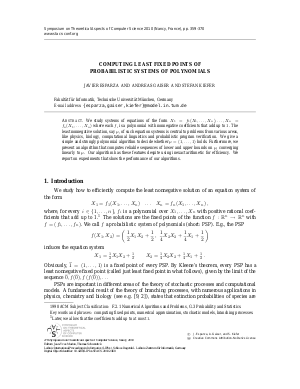Computing Least Fixed Points of Probabilistic Systems of Polynomials
Authors Javier Esparza, Andreas Gaiser, Stefan Kiefer
-
Part of:
Volume:
27th International Symposium on Theoretical Aspects of Computer Science (STACS 2010)
Part of: Series: Leibniz International Proceedings in Informatics (LIPIcs)
Part of: Conference: Symposium on Theoretical Aspects of Computer Science (STACS) - License:
 Creative Commons Attribution-NoDerivs 3.0 Unported license
Creative Commons Attribution-NoDerivs 3.0 Unported license
- Publication Date: 2010-03-09
File

PDF
LIPIcs.STACS.2010.2468.pdf
- Filesize: 182 kB
- 12 pages
Document Identifiers
Subject Classification
Keywords
- Computing fixed points
- numerical approximation
- stochastic models
- branching processes
Metrics
- Access Statistics
-
Total Accesses (updated on a weekly basis)
0Document
0Metadata
Abstract
We study systems of equations of the form $X_1 = f_1(X_1, \ldots, X_n), \ldots, X_n = f_n(X_1, \ldots, X_n)$ where each $f_i$ is a polynomial with nonnegative coefficients that add up to~$1$. The least nonnegative solution, say~$\mu$, of such equation systems is central to problems from various areas, like physics, biology, computational linguistics and probabilistic program verification. We give a simple and strongly polynomial algorithm to decide whether $\mu=(1,\ldots,1)$ holds. Furthermore, we present an algorithm that computes reliable sequences of lower and upper bounds on~$\mu$, converging linearly to~$\mu$. Our algorithm has these features despite using inexact arithmetic for efficiency. We report on experiments that show the performance of our algorithms.
Cite As Get BibTex
Javier Esparza, Andreas Gaiser, and Stefan Kiefer. Computing Least Fixed Points of Probabilistic Systems of Polynomials. In 27th International Symposium on Theoretical Aspects of Computer Science. Leibniz International Proceedings in Informatics (LIPIcs), Volume 5, pp. 359-370, Schloss Dagstuhl – Leibniz-Zentrum für Informatik (2010)
https://doi.org/10.4230/LIPIcs.STACS.2010.2468
BibTex
@InProceedings{esparza_et_al:LIPIcs.STACS.2010.2468,
author = {Esparza, Javier and Gaiser, Andreas and Kiefer, Stefan},
title = {{Computing Least Fixed Points of Probabilistic Systems of Polynomials}},
booktitle = {27th International Symposium on Theoretical Aspects of Computer Science},
pages = {359--370},
series = {Leibniz International Proceedings in Informatics (LIPIcs)},
ISBN = {978-3-939897-16-3},
ISSN = {1868-8969},
year = {2010},
volume = {5},
editor = {Marion, Jean-Yves and Schwentick, Thomas},
publisher = {Schloss Dagstuhl -- Leibniz-Zentrum f{\"u}r Informatik},
address = {Dagstuhl, Germany},
URL = {https://drops.dagstuhl.de/entities/document/10.4230/LIPIcs.STACS.2010.2468},
URN = {urn:nbn:de:0030-drops-24685},
doi = {10.4230/LIPIcs.STACS.2010.2468},
annote = {Keywords: Computing fixed points, numerical approximation, stochastic models, branching processes}
}
